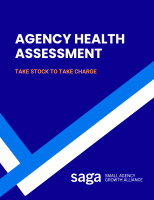Chip was recently asked to share his strategic approach to asking questions during initial calls with prospective clients.
He emphasizes the importance of going beyond surface-level responses and uncovering the specific triggers or events within the organization that led to the decision to seek external assistance.
Additionally, Chip recommends inquiring about the client’s expectations for success, discussing budget considerations transparently, and evaluating the prospect’s alignment with the agency’s ideal client profile to ensure a mutually beneficial fit.
Related
- Setting expectations for agency clients
- ALP 28: Saying no to prospects and firing clients of your agency
- Get to Know Your Clients Better
- ALP 31: Do you negotiate pricing with prospective clients?
- Should you share your ideas with prospective clients?
The following is a computer-generated transcript. Please listen to the audio to confirm accuracy.
What questions should I ask my potential clients? That’s the latest Ask Chip that comes to us from a community member who had been listening to Gini Dietrich’s Spin Sucks podcast and she mentioned that I have a particular way of asking questions during initial calls with prospects to really understand more about the potential engagement to decide if it is something that is worth pursuing.
So the first question that I like to ask is, what brings us here today? Typically, a prospect is going to say something like, well, you know, we were looking for a PR agency or marketing agency and your name came up, so we thought it would be good to chat. And that’s fine. It’s a polite answer, but it doesn’t really tell you anything.
The reality is there was likely some sort of precipitating event within the organization that caused them to think that now is the time to go out and start looking for some kind of a solution to the specific challenge or opportunity that they have. So I like to press further, and I like to ask them, No, really, what was the actual thing that triggered you to have this conversation?
And if you keep pressing and keep digging, typically you will find out that something actually happened. It may have been that the CEO pounded his fist on the table and said, My competitor’s in the Wall Street Journal, why can’t we be there too? It might be that there was a meeting about planning and they talked about how there was a need for more leads coming from marketing.
And so they decided that they needed some outside help in order to increase the number of leads. The more you can understand about that actual trigger, the better you have context for the conversations that you will have going forward. The next question that I like to ask is a year from now, how will we know that we’ve been successful in the work that we’ve done together?
And it could be a year, it could be less, it really depends on what your typical engagements look like. But you want to understand, what are they going to be measuring the results by? And so their answer might be something like, well we expect to have at least five or ten clips a month. Or we expect that we will have been in the Wall Street Journal at least three times by the end of the year.
Or perhaps they’ll say We want to see two to three times the number of leads that we have today. The more you understand about their very specific expectations and how they’re going to determine if the work that you did was a success, the better off you will be in putting together a solution that actually meets those expectations.
And more importantly, it helps you to understand if you can even meet those expectations. Because if they are unrealistic, now is the time to reset those expectations and make sure that they understand what you can actually achieve if you work together. Because if you allow unrealistic expectations to go unchecked at the prospect stage, it will come back to bite you at some point in the future.
And we all like to keep people happy during these initial prospect calls because we get excited about the opportunity of working with someone new, generating new revenue. But we also need to make sure that we’re thinking about the long term and how we can retain the work how we can generate positive results that will generate positive word of mouth that will help us to continue to grow our agencies.
The next question that I like to ask is some variation of the budget question. Now I don’t enjoy asking what is your budget?
Because almost no prospect will ever give you a useful answer to that question. Most will say something like, Well, we’re just beginning our process of investigating it. You’re the expert. Why don’t you tell us what you think it would cost to solve our particular problem? And if you fall into that trap, then what you’re doing is you’re passing up on an opportunity to really understand from them what their expectations are from a financial standpoint.
The reality is most of them don’t actually have a specific budget. So, if you continue to pursue this, as some would suggest you do, you’re likely never to get an answer that will be satisfactory. So instead, what I like to do is to share some variation of the statement. Well, typically our engagements cost between $5,000 and $10,000 a month.
Does that sound reasonable to you? Does that sound like it’s within your expectations? You might say, we have a minimum engagement of $10,000, and so that sets your floor, and so at that point it’s a way for them to gracefully exit the conversation if it’s not a fit. You can also ask, you can put it in terms of this particular problem will cost probably somewhere, it sounds like between $20,000 and $30,000, to solve.
Would that work for you? And so all of these things are good ways to get some idea of whether there is a financial match between you and the prospect so that neither one of you is wasting your time. And it’s really not just the words that they say, but it’s how they react. So if you’re able to do this in a video call or in person, you can watch the body language as you share a number with them and get a feeling for whether or not this is within what they were expecting or if they are truly surprised by it.
Even if it’s an audio only call, though, you can listen for the cues. If you say it’s going to cost between $20,000 and $30,000 in all likelihood, and there’s a long pause, that tells you something, right? That tells you that perhaps you’re either above their expectations, or certainly at the higher end of their expectations.
And finally, I like to ask some questions about the prospect to see if they’re a match for our ideal client profile. And if you haven’t defined your ideal client profile with a lot of detail, now’s a good time to do that. And so you want to look at things like, Do you work best with prospects who have worked with an agency or not worked with an agency before?
Do you work better with an established CMO or a new CMO? Do you work better with an experienced Chief Communications Officer? Or someone who is new to that kind of a role. All of these things will help you, but it’s also things like geography, the size of the business, the age of the business, whether you’re working with the decision maker, the budget holder, or whether you’re working with a whole team of people on the other end.
All of these go into figuring out if you have a real fit. And if you can ask questions to make sure that you are checking off as many boxes as you can for the ideal client and making sure that you’re not hearing any of those red flags that suggest that it will not be a good fit, then you have set yourself up for a good prospect meeting.
So focus on asking these questions. It’s all about making sure that there is truly a fit, that you truly can produce the kinds of results that the prospect is looking for, that you can do so within a financial framework that works for both you and them, and that at the end of the day you will be taking on a project that you believe can be a success all the way around.
So those are the questions I like to ask in a prospect meeting. Hopefully that’s been beneficial to you. If you have your own questions, I would encourage you to use the Ask Chip form on the SAGA website. Just go to smallagencygrowth.com. If you’re looking for additional resources about questions that you can ask for prospects, defining your ideal client, positioning your agency, you can find those resources on the SAGA website as well.
So, thanks for listening, and I look forward to seeing you on another Ask Chip segment again soon.









